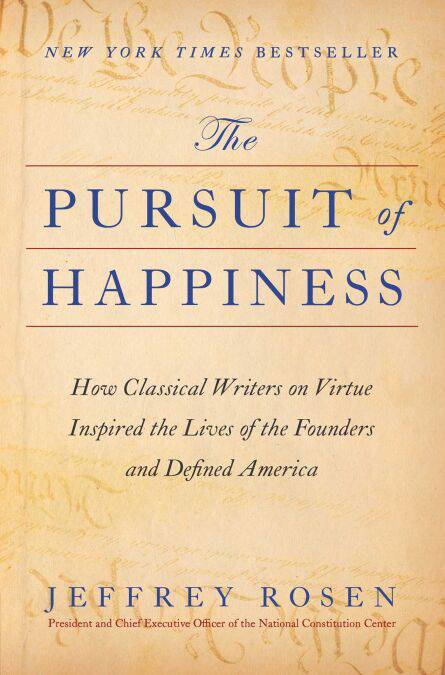
- Afhalen na 1 uur in een winkel met voorraad
- Gratis thuislevering in België vanaf € 30
- Ruim aanbod met 7 miljoen producten
- Afhalen na 1 uur in een winkel met voorraad
- Gratis thuislevering in België vanaf € 30
- Ruim aanbod met 7 miljoen producten
Zoeken
The Pursuit of Happiness E-BOOK
How Classical Writers on Virtue Inspired the Lives of the Founders and Defined America
Jeffrey Rosen
E-book | Engels
€ 16,76
+ 16 punten
Uitvoering
Omschrijving
A New York Times bestseller and an “enriching…brilliant” (David W. Blight, Pulitzer Prize–winning author of Frederick Douglass) examination of what “the pursuit of happiness” meant to our nation’s Founders and how that famous phrase defined their lives and became the foundation of our democracy.
The Declaration of Independence identified “the pursuit of happiness” as one of our unalienable rights, along with life and liberty. Jeffrey Rosen, the president of the National Constitution Center, profiles six of the most influential founders—Benjamin Franklin, George Washington, John Adams, Thomas Jefferson, James Madison, and Alexander Hamilton—to show what pursuing happiness meant in their lives, and to give us the “best and most readable introduction to the ideas of the Founders that we have” (Gordon Wood, author of Power and Liberty).
By reading the classical Greek and Roman moral philosophers who inspired the Founders, Rosen shows us how they understood the pursuit of happiness as a quest for being good, not feeling good—the pursuit of lifelong virtue, not short-term pleasure. Among those virtues were the habits of industry, temperance, moderation, and sincerity, which the Founders viewed as part of a daily struggle for self-improvement, character development, and calm self-mastery. They believed that political self-government required personal self-government. For all six Founders, the pursuit of virtue was incompatible with enslavement of African Americans, although the Virginians betrayed their own principles.
“Immensely readable and thoughtful” (Ken Burns), The Pursuit of Happiness is more than an elucidation of the Declaration’s famous phrase; it is a revelatory journey into the minds of the Founders, and a deep, rich, and fresh understanding of the foundation of our democracy.
The Declaration of Independence identified “the pursuit of happiness” as one of our unalienable rights, along with life and liberty. Jeffrey Rosen, the president of the National Constitution Center, profiles six of the most influential founders—Benjamin Franklin, George Washington, John Adams, Thomas Jefferson, James Madison, and Alexander Hamilton—to show what pursuing happiness meant in their lives, and to give us the “best and most readable introduction to the ideas of the Founders that we have” (Gordon Wood, author of Power and Liberty).
By reading the classical Greek and Roman moral philosophers who inspired the Founders, Rosen shows us how they understood the pursuit of happiness as a quest for being good, not feeling good—the pursuit of lifelong virtue, not short-term pleasure. Among those virtues were the habits of industry, temperance, moderation, and sincerity, which the Founders viewed as part of a daily struggle for self-improvement, character development, and calm self-mastery. They believed that political self-government required personal self-government. For all six Founders, the pursuit of virtue was incompatible with enslavement of African Americans, although the Virginians betrayed their own principles.
“Immensely readable and thoughtful” (Ken Burns), The Pursuit of Happiness is more than an elucidation of the Declaration’s famous phrase; it is a revelatory journey into the minds of the Founders, and a deep, rich, and fresh understanding of the foundation of our democracy.
Specificaties
Betrokkenen
- Auteur(s):
- Uitgeverij:
Inhoud
- Aantal bladzijden:
- 368
- Taal:
- Engels
Eigenschappen
- Productcode (EAN):
- 9781668002490
- Verschijningsdatum:
- 12/02/2024
- Uitvoering:
- E-book
- Beveiligd met:
- Adobe DRM
- Formaat:
- ePub

Alleen bij Standaard Boekhandel
+ 16 punten op je klantenkaart van Standaard Boekhandel
Beoordelingen
We publiceren alleen reviews die voldoen aan de voorwaarden voor reviews. Bekijk onze voorwaarden voor reviews.











